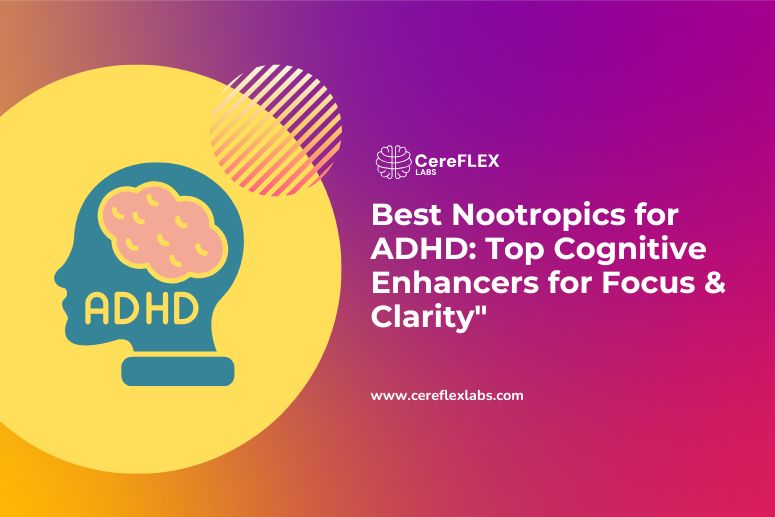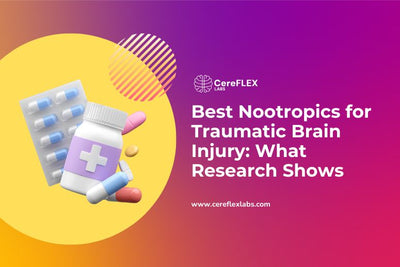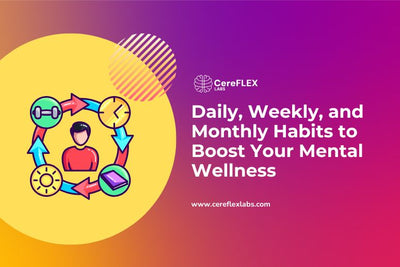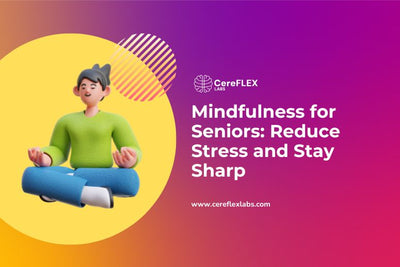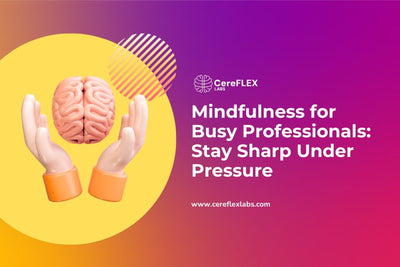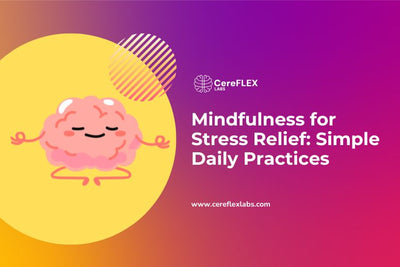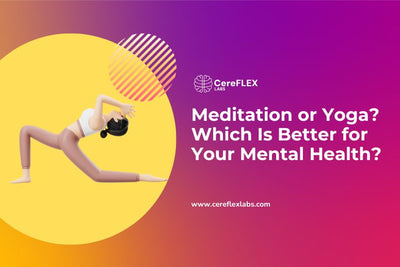For people with ADHD, staying focused, organized, or emotionally balanced isn’t just difficult—it’s a daily challenge. Simple tasks can feel overwhelming, and distractions come fast and often.
While prescription medications are the standard treatment, they aren’t the right fit for everyone. Some lose effectiveness over time, cause uncomfortable side effects, or don’t align with personal health goals. That’s why many people are exploring nootropics—brain-enhancing compounds that may offer alternative support.
Nootropics range from time-tested herbs like Bacopa and Rhodiola to modern compounds like Modafinil. Some aim to sharpen attention. Others help with stress, energy, or memory. But with so many options, it’s hard to know which nootropics are actually helpful for ADHD—and which are just hype.
In this guide, we’ll break down which natural and synthetic nootropics show the most promise for ADHD. You’ll learn how they work, what the research says, and how to use them safely—especially if you’re already on medication.
We’ll also explore how Cereflex Labs’ AM/PM Protocol offers targeted, all-day cognitive support for those navigating ADHD.
Here is the Quick Answer |
|
ADHD affects focus, organization, and emotional regulation. While prescription meds help, some prefer natural or non-stimulant alternatives. Nootropics may support attention, reduce impulsivity, and improve clarity. Natural options like Ginkgo Biloba, Rhodiola, Bacopa, L-Theanine, and Citicoline offer gentle support. Synthetic picks like Modafinil and Methylphenidate work faster but carry more risk. Always consult your doctor, especially when combining nootropics with medication. |

ADHD and Cognitive Function
ADHD is more than just distraction or excess energy. It’s a lifelong neurodevelopmental condition rooted in the brain’s executive function systems.
People with ADHD often struggle with:
- Staying organized
- Managing time and priorities
- Regulating emotions
- Focusing for extended periods
- Avoiding impulsive decisions
These challenges can show up at work, in school, and in daily routines. They often affect relationships and self-esteem as much as productivity.
Executive functions—mental skills that help you plan, focus, and self-regulate—are often impaired in ADHD. When these functions are disrupted, everyday tasks feel harder and mental energy drains faster.
Medication can help, but it doesn’t work for everyone. Side effects, diminishing returns, or personal preferences can lead people to seek additional options.
This is where nootropics may offer a complementary solution. The right compounds can help sharpen focus, calm the mind, and support mental performance in ways that align with how the ADHD brain functions.
ADHD’s Brain Chemistry Connection
ADHD is strongly linked to imbalances in brain chemicals called catecholamines. These include:
- Dopamine: involved in motivation, reward, and attention
- Norepinephrine: supports focus, mental alertness, and sustained effort
- Epinephrine: activates mental and physical energy during stress
These neurotransmitters help regulate executive functions like decision-making, self-control, and working memory.
When these chemicals are low or poorly regulated, the brain struggles to prioritize tasks, manage impulses, or stay engaged. That’s why people with ADHD often feel distracted, disorganized, and mentally overloaded.
The good news: many nootropics influence these same neurotransmitter systems. Some boost dopamine or norepinephrine naturally. Others help modulate stress or protect brain cells from oxidative damage.
By improving the brain’s chemical balance, certain nootropics may help reduce the cognitive friction that characterizes ADHD—offering support for attention, calm, and mental stamina.
Do nootropics help ADHD?
Research on nootropics for ADHD is still evolving, but there’s growing interest in how both natural and synthetic compounds might support core symptoms like inattention, impulsivity, and cognitive fatigue.
Some nootropics appear to target the same brain pathways involved in ADHD—mainly dopamine and norepinephrine regulation. Others help by reducing anxiety, boosting blood flow to the brain, or supporting neuroplasticity.
For example, a 2020 study found that methylphenidate (Ritalin) significantly improved attention and executive function in children with ADHD, reinforcing its role as a go-to prescription treatment.1
On the natural side, nutrients like omega-3 fatty acids have been shown to help reduce hyperactivity and improve focus, especially in younger individuals with ADHD.2
Still, responses vary. What works for one person might not work for another, and benefits often depend on dosage, consistency, and individual brain chemistry.
How Nootropics Can Support ADHD Symptoms
Nootropics aren’t a cure for ADHD, but the right compounds may offer meaningful support—especially when tailored to individual needs and used alongside a healthy routine.
They work in various ways, depending on the compound:
- Supporting neurotransmitters like dopamine, norepinephrine, and acetylcholine—key players in attention and motivation.
- Enhancing blood flow to the brain, which improves oxygen and nutrient delivery.
- Reducing oxidative stress and inflammation, both of which may impair mental clarity.
- Modulating stress hormones, helping with emotional regulation and impulse control.
Together, these effects may help reduce the core challenges associated with ADHD, such as:
- Difficulty focusing or staying on task
- Mental fatigue and poor cognitive endurance
- Mood swings and irritability
- Overreaction to stress or emotional triggers
While results can vary, many people with ADHD report improvements in focus, calmness, and mental stamina when using nootropics—especially when stacked thoughtfully and monitored closely.
Best Natural Nootropics for ADHD
When managing ADHD symptoms, natural nootropics offer a gentle yet effective approach. They often target neurotransmitter activity, reduce stress, and support brain health—without the harsh side effects of traditional stimulants.
Below are some of the most researched and promising plant-based and nutrient-derived nootropics for supporting attention, mood, and executive function.

Ginkgo Biloba
Ginkgo may improve cognitive function by increasing blood flow to the brain and supporting oxygen delivery.
In a 6-week study with children and teens diagnosed with ADHD, those who took Ginkgo (80–120 mg/day) alongside methylphenidate showed significantly greater improvements in attention and symptom reduction compared to placebo.3

Rhodiola Rosea
Rhodiola rosea is an adaptogenic herb that enhances dopamine and norepinephrine levels—neurotransmitters commonly deficient in ADHD. It also supports emotional balance by reducing cortisol levels.
Though not ADHD-specific, clinical studies have shown Rhodiola improves attention, mood stability, memory, and resilience under stress.4

Bacopa Monnieri
Known for enhancing memory and learning, Bacopa also appears effective for attention and self-control in ADHD.
In a study using 225 mg of standardized Bacopa (BacoMind®) daily for 6 months, children showed improvements in attention (85%), self-control (89%), and reduced restlessness (93%), with minimal side effects.5

L-Theanine
L-Theanine is a calming amino acid found in green tea. It supports sustained attention and may counteract the jitteriness associated with stimulant medications.
In one study of boys with ADHD, L-Theanine alone improved attention—but also increased impulsivity. However, when paired with caffeine, it improved focus while decreasing impulsivity. These effects were linked to reduced activity in the brain’s default mode network.6

Citicoline (CDP-Choline)
Citicoline supports dopamine activity and psychomotor speed—two areas often impaired in ADHD.
In a study with healthy adolescent males, 28 days of citicoline supplementation led to improved reaction time, attention accuracy, and reduced impulsivity compared to placebo.7 These results suggest citicoline may be beneficial for managing core ADHD symptoms.
➤ Note: These compounds may be helpful for those seeking alternatives or complements to prescription medications. However, quality matters—look for reputable, third-party tested supplements with clinically supported dosages.
Our buyer’s guide to safe herbal supplements can help you identify trustworthy sources.
Synthetic Nootropics for ADHD
While natural nootropics offer steady support, synthetic compounds tend to act faster and more directly on neurotransmitters like dopamine and norepinephrine. These are the very systems implicated in ADHD, making synthetics appealing for some individuals—especially those seeking stronger, more immediate results.
However, synthetic nootropics come with more risks and should be used under medical supervision.
Modafinil
Originally developed for narcolepsy, Modafinil is widely used off-label for enhancing focus, alertness, and mental stamina.
It works by influencing dopamine and norepinephrine activity. A study shows it can reduce impulsivity and improve attention in children with ADHD.8 Its lower abuse potential compared to stimulants makes it a viable alternative for some.
Piracetam
As one of the first synthetic nootropics, Piracetam supports brain cell membrane fluidity and inter-hemispheric communication.
In a study of children aged 6–13 with ADHD, Piracetam monotherapy (50–70 mg/kg/day) for six weeks showed symptom improvement compared to no treatment. However, its effects were slower and less pronounced than prescription medications like atomoxetine.9

Methylphenidate
A well-known prescription stimulant, Methylphenidate (e.g., Ritalin) increases dopamine and norepinephrine in the brain.
It remains one of the most effective and fast-acting medications for ADHD, especially in reducing hyperactivity and inattention. However, side effects, risk of dependency, and tolerance are concerns.10
➤ Note: Synthetic nootropics can be powerful tools, but they require caution. Always consult a healthcare provider before using them—especially if you’re already on prescription ADHD medication or other supplements.
Natural vs. Synthetic Nootropics for ADHD
Both natural and synthetic nootropics can help with ADHD symptoms, but they differ in how they work, how quickly they act, and their risk profiles. Knowing these differences can help you choose what fits best with your goals, sensitivities, and lifestyle.
Natural Nootropics: Pros & Cons
Natural options offer a gentler approach with fewer side effects. They're ideal for people seeking long-term support, especially those cautious about stimulants.
Pros:
- Safe for long-term use when properly dosed
- Widely available over-the-counter
- Support neurotransmitter balance gradually
- Lower risk of dependency or withdrawal
Cons:
- Effects may take weeks to become noticeable
- Typically milder than pharmaceutical options
- Some lack large-scale clinical validation
- Product quality can vary between brands
Synthetic Nootropics: Pros & Cons
Synthetic nootropics often work faster and more powerfully—but with greater risks. These compounds typically target dopamine and norepinephrine more directly.
Pros:
- Stronger, faster cognitive enhancement
- Backed by clinical use for ADHD
- Effective for reducing impulsivity and boosting attention
Cons:
- Higher risk of insomnia, anxiety, and side effects
- Potential for dependency or tolerance
- Often require prescriptions or medical oversight
- Not suitable for all users
Accessibility and Safety
Natural nootropics are easier to access and pose fewer regulatory hurdles. They're safe for most healthy individuals when taken as directed—but it's still important to be aware of drug interactions.
Synthetic options may offer more dramatic results but require a prescription or close monitoring. Some (like Adrafinil) are available OTC but may carry risks like liver strain or inconsistent quality.
Combining Nootropics with Prescription ADHD Medications
Some people combine nootropics with prescription medications to extend focus, ease side effects, or support brain health long-term. This approach is known as stacking—but it must be done carefully.
For example, L-Theanine can reduce jitteriness from stimulants like Adderall or Citicoline may support memory and boost brain energy during or between medication doses. Additionally, Rhodiola or Ashwagandha may help balance mood or cortisol affected by stimulants.
Risks to Watch For:
⚠️ Overstimulation: Combining stimulants with dopaminergic or energizing nootropics can raise blood pressure, disrupt sleep, or cause anxiety.
⚠️ Diminished medication effects: Some natural compounds might interfere with how drugs are absorbed or metabolized.
⚠️ Unpredictable interactions: Even plant-based nootropics can interact with SSRIs, stimulants, or sleep meds.
Best Practices:
✔ Always consult your doctor before stacking.
✔ Introduce new supplements one at a time.
✔ Monitor your mood, focus, and sleep—keep a log if needed.
✔ Stick with high-quality products and avoid DIY mega-stacks.
Used thoughtfully, nootropics can support your medication regimen. But safety comes first—especially with ADHD treatments.
Conclusion
Managing ADHD is complex, and while prescription treatments remain essential for many, some are exploring lifestyle-based approaches to support cognitive wellness. Nootropics—both natural and synthetic—can enhance clarity, motivation, and resilience when used mindfully and with professional guidance.
At Cereflex Labs, we focus on whole-day cognitive support through clean, research-backed ingredients.
Our AM/PM Protocol includes two synergistic formulas that work with your body’s natural rhythms:
✅ The AM Brain Morning Formula helps support focus, clarity, and mental energy through ingredients like L-Tyrosine, Citicoline, and Rhodiola Rosea.
✅ The PM Cognitive Support Formula promotes nighttime relaxation and cellular recovery with nutrients for emotional balance, memory consolidation, and stress resilience.
Together, they provide a structured, stimulant-free foundation for daily cognitive performance—without overstimulation or crash.
Want better mental clarity from morning to night? Discover the AM/PM Protocol—a clean, plant-based system for long-term brain health and performance.
